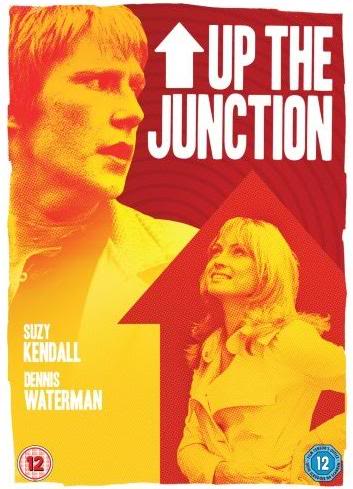
UP THE JUNCTION
UK, 1967, 119 minutes, Colour.
Suzy Kendall, Denis Waterman.
Directed by Peter Collinson.
Up the Junction is in the tradition of the 'kitchen sink' dramas of the early sixties. By the end of the decade these dramas were being filmed in colour and wide-screen. The atmosphere and mood of the earlier films continued, but language and frankness became more explicit. The film is based on stories by Nell Dunn (as was Kenneth Loach's Poor Cow), and presents typical contemporary attitudes to life, work and pleasure.
The story and language of the film are quite blunt, yet the jokes, the gossip, the swearing can be heard in any office, factory or even secondary school. The central character is Polly Dean, a rich girl from Chelsea, who wants to escape from society hypocrisy and live a poor, earthy, hard-working life in Battersea across the Thames. Her work, her friends, their entertainments, their difficulties, become hers. Though she never really fits into their society (they themselves would like to escape from it), she idealises it, only to be disillusioned.
The actress is Suzy Kendall and the film was directed by Peter Collinson whose film subjects have ranged widely: The Penthouse, The Long Day's Dying, The Italian Job, You Can't Win 'Em All, Fright.
1. Did the theme of a rich girl trying to avoid the hypocrisy of wealthy society by working in and with the poorer areas of society seem convincing to you: Why?
2. What was Polly searching for in her move from Chelsea to the Battersea factories, flats and pubs?
3. What were the values of her friends, Sylvie, Ruby and Peter? As regards poverty? work? the rich? pleasure? sex? right and wrong? life?
4. Discuss your attitudes to Ruby and her abortion, Polly's helping her, Ruby's agony and the speed with which she forgot her suffering.
5. Discuss the presentation of factory life and the work, the company, the conditions, the jokes, the hum-drum situations of gossip, scandal.
6. Was Peter an attractive character? a strong character? Can you understand his attitude to Polly at the end of the film?
7. What happened to Polly in her story after the film ended? To Peter, to Sylvie, to Ruby?
8. Is it fair to say that life for the character in this Battersea situation was, and had to be, a cult of materialism - clothes, beauty, pleasure, comforts, companionship?
9. Was Polly realistic? or an idealist?
10. Are people born into poverty and work situations grateful to people who ache to share their lives? Or are the poor longing to get out of their poverty?